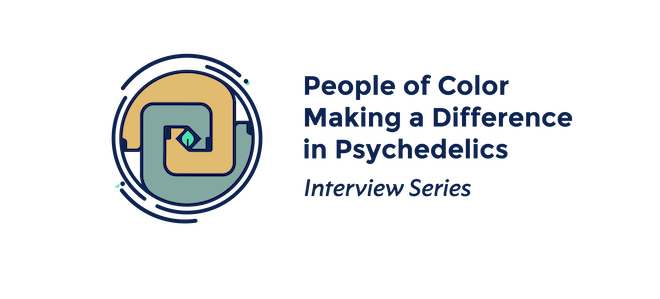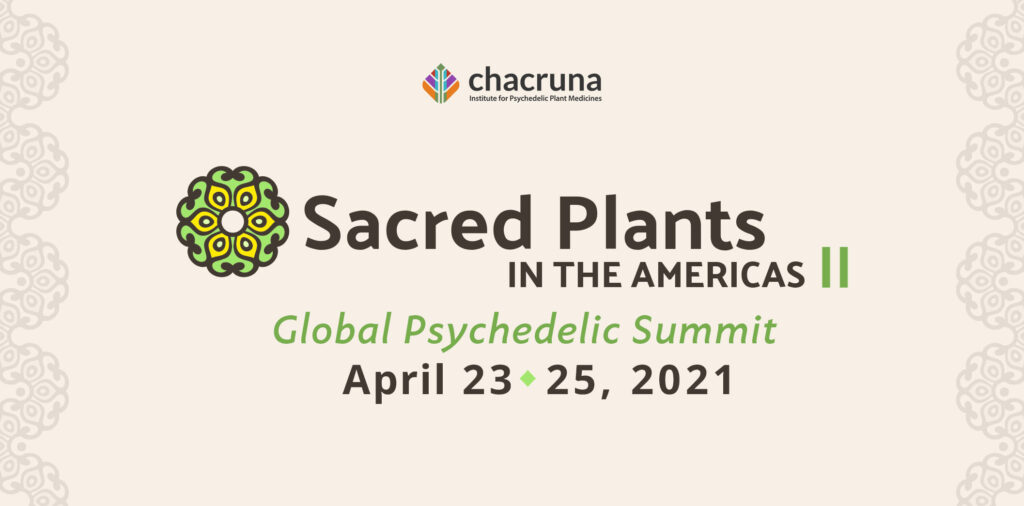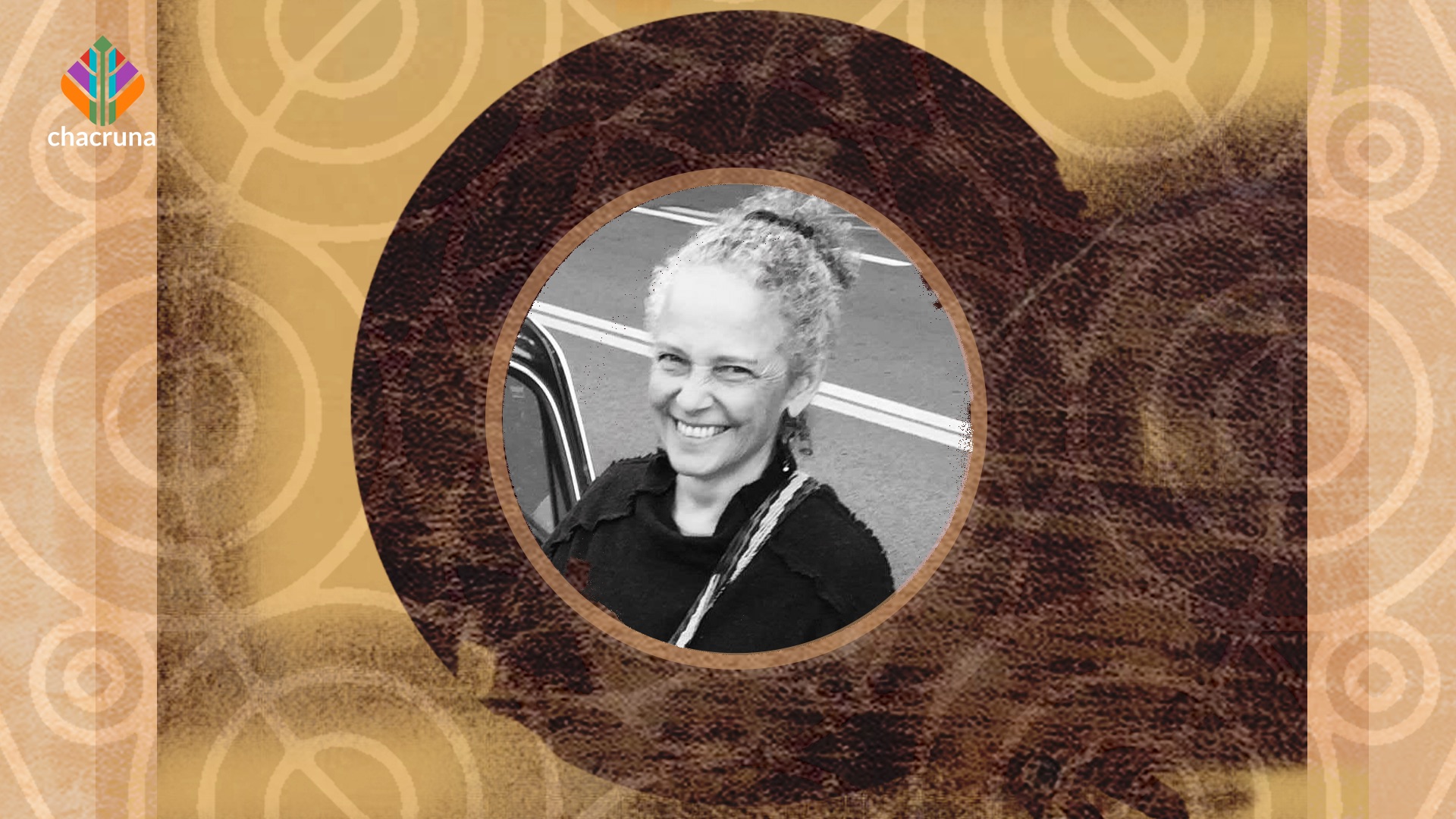- Entheogens, the African Diaspora, and BIPOC communities with Kufikiri Imara - January 20, 2021
- Innovating Native American Health Care Using Culture and Technology With Sutton King - January 11, 2021
- Navigating the Personal and Political in MDMA-assisted Psychotherapy with Sara Reed - December 29, 2020

Originally from Colombia, Marcela was first introduced to MDMA in the 1980s. She was 23 years old and suffering from PTSD. Where other treatments failed her, MDMA changed her life.
Marcela Ot’alora G has been facilitating MDMA for over 20 years and ketamine-assisted psychotherapy for three years. Originally from Colombia, Marcela was first introduced to MDMA in the 1980s. She was 23 years old and suffering from PTSD. Where other treatments failed her, MDMA changed her life. She decided to pursue psychology as a career in order to bring MDMA therapy to those suffering from PTSD and, more broadly, to underserved communities.
Since 1999, Marcela has worked for the Multidisciplinary Association for Psychedelic Studies (MAPS) as a co-therapist and a principal investigator in various studies concerning MDMA as a treatment for PTSD, and in a study for therapists in training. Furthermore, she has been a seminal force behind MAPS’ current efforts to get MDMA through the FDA approval process as a prescription for PTSD by 2023. As a respected and beloved figure in the psychedelic community, Marcela maintains a private practice in Boulder, Colorado and trains therapists to work with MDMA. Thus, she has played an integral role in building a Western healing modality based in empowerment, connection, and choice.
In this interview, Marcela Ot’alora G talks about the MAPS phase III MDMA clinical trials, PTSD as a condition, facilitating MDMA-assisted psychotherapy, and shares her thoughts on how to ensure access and accessibility to marginalized communities.
Maria Mocerino: What’s the update with the phase III MDMA clinical trials?
Marcela Ot’alora G: We’ve just begun the screening process for the second half of phase III. We’ll be treating another 100 participants throughout the 15 MAPS-sponsored sites. We’ll still be assessing the efficacy and safety of MDMA, as we did in the first half of phase III. We’ll also be collecting more data on its physical effects. This is all in preparation for MDMA becoming a medicine, we hope, in 2023.
MM: Let’s say MDMA get approved by the FDA. What would this look like, initially?
MO: It’s not like people will be able to just go and get MDMA. There will be certified clinics throughout the US, Canada, and Europe run by people that have gone through the MAPS training program to do this work. The treatment model will look similar to what we currently have. However, there will be more flexibility in terms of the treatment programs that we are able to offer.
For example, maybe we can spread someone’s treatment over a period of time that is longer than three months and be able to tailor the treatment to each participant. That might make it more accessible for some, in the beginning. At MAPS, we’re committed to finding ways to serve the underserved when MDMA-assisted psychotherapy becomes a legal treatment. We are doing this through initiatives and grants to help pay the costs.
MM: You’ve been working with MDMA in a clinical setting for over 20 years. From your perspective, how do we begin to address this issue of access?
MO: We need to begin where it is the most needed. That includes marginalized communities. However, they aren’t just going to join a study, for example. They could have had traumatic experiences with Western doctors, or had exchanges with medical personnel who were not culturally informed. What has their experience been like? What has their family’s experience been like? What about people without access to transportation?
The commitment of therapists working with marginalized communities needs to go beyond the initial intake. We have to take that extra step to reach members of marginalized communities and make them feel like they are heard and seen because, often, unfortunately, their experience has not been that of feeling welcomed.
I used to be a consultant for therapists that worked with Latino populations. I told them that they couldn’t just give them the resources. They might have to call them, because they might not read English. They might not even have a phone. Maybe they are terrified of making that call to a therapist. The commitment of therapists working with marginalized communities needs to go beyond the initial intake. We have to take that extra step to reach members of marginalized communities and make them feel like they are heard and seen because, often, unfortunately, their experience has not been that of feeling welcomed.
We might not know why someone from a marginalized community distrusts the medical care system, but we can ask questions from a place of curiosity and find out. As therapists, we want to have a beginner’s mind and come from a place of curiosity and cultural humility so that we can actually help a person. We need to have an understanding of the person’s culture and who they are as a human being.
MM: What about training therapists of color to help introduce MDMA-assisted psychotherapy to their communities?
MO: Training therapists from different communities is great. People will feel safer, and generally better understood, by doctors and therapists from the same culture. I don’t think we want to fall into a trap, however, of sending all Black people to Black therapists, for example. We can’t just do that and wipe our hands clean.
I used to be a therapist in schools in Boulder that had a high percentage of Latino students, mostly Mexican children. I am a Colombian woman. Every week, I had a teacher, coach, and even a janitor come up to me and say, “Your kids are doing something over there. You need to go and tell them to not do that.”
“My kids go to a different school,” I clarified to them. “These are our kids, right?” There was a mentality that all the Latino children were my responsibility because I was the Latina at the school. I think we need to stop doing that.
MM: How do you see this treatment getting into marginalized communities?
MO: We need to have clinics in marginalized communities. They can’t be in another town. That way, people will feel that they have access to it. For that purpose, it is advantageous to have therapists of color that can bring it into their communities. I hope we can. We can’t stop people from having different agendas in terms of how they want to see psychedelics in the mainstream, and I hope we can maintain the integrity of the modality and have people’s healing as the main priority.

Join us at Sacred Plants in the Americas II
If you think about it, if someone hasn’t been able to breathe for 20 years, if a person is holding tension in their body due to the hypervigilance that often accompanies PTSD, there are going to be physical issues.
MM: Have you noticed that people’s physical ailments start to subside when they start this healing process?
MO: Absolutely. There are a lot of links between trauma, mental health, and physical conditions. If you think about it, if someone hasn’t been able to breathe for 20 years, if a person is holding tension in their body due to the hypervigilance that often accompanies PTSD, there are going to be physical issues. Maybe they can’t quite relate it to trauma. A doctor might not be able to either. That’s why having treatment that works for people with PTSD is important. It’s affecting their bodies every single day.
MM: Feelings and emotions are usually not factored as a probable cause for disturbances in one’s health in Western medicine.
MO: Everything in the West is separated and compartmentalized into little boxes. No wonder we live in a patriarchal society (laughter).
I have one little story. After the MDMA sessions, we always follow up with the participants, not just for the purposes of the study, but because we want to know what’s changed for them in general. One person said that they went to a doctor and grew an inch. We all had a laugh about “MDMA making you grow.” Really, what she was doing was standing tall. She was no longer hunching over. Talk about a physical manifestation.
MM: How did you get into facilitating psychotherapy with MDMA?
MO: I had MDMA-assisted psychotherapy for PTSD when I was 23 in 1984, the year before MDMA was criminalized. It was incredibly helpful for me. I had tried a lot of different treatments before and nothing worked, so I wanted more people to have access to this medicine. It was devastating that it was not a treatment with access to all who needed it and wanted it.
I went back to school, studied transpersonal psychology, and got myself ready to help people in their healing process. Finally, in 1999, a study was approved in Spain to treat women with MDMA who had PTSD from sexual abuse or assault. Unfortunately, the study was shut down after only six or seven women were seen.
MM: Why was the MDMA study shut down?
MO: There was a lot of erroneous information going around about MDMA. It was said that MDMA could cause holes in the brain, so I think the government was scared. It was the first time that they were conducting this kind of study.
When I see over 400 people on the waiting list for 15 spots in the MDMA clinical trials, it’s a reality check. It shows how many people are suffering and want this treatment.
Changing the narrative around MDMA has been a slow process. It hasn’t been slow in the last few years. For 20–25 years, though, it was very, very slow. It hasn’t always been easy for me. When I see over 400 people on the waiting list for 15 spots in the MDMA clinical trials, it’s a reality check. It shows how many people are suffering and want this treatment. But I remember what I’m working towards: the possibility of bringing this modality to more people, especially in vulnerable populations. That keeps me going.
MM: How many people know they have PTSD? Do you think we even understand how many people are suffering from this?
MO: A lot of people don’t know that they have PTSD. Meaning, they don’t call it that.However, I think that these people know that they are suffering a great deal. It’s incredibly challenging to be alive. Education and media have changed this somewhat, but oftentimes people think that PTSD is something that only happens to veterans of war. I’ve heard that in MDMA sessions. “I haven’t been to war, so I don’t have it as bad.” Some participants in the clinical trials even felt guilty that they had gotten into the study.
MM: You’ve talked about how choice is taken away from people with PTSD. Thus, it’s amazing that people are coming out of these MDMA-assisted psychotherapy sessions feeling like they have a choice. Can you go into a little more depth as to what you mean by that?
MO: In most cases, trauma that results in PTSD is harm inflicted by another person. They did not have a choice about what was being done to them. As a result, they feel that choice is not available to them. They do not want to be affected by the trauma, and they do not have a choice about this. Healing brings back choice.
One of the ways that I describe PTSD, and of course, this doesn’t happen for everyone, is that shame and fear become one’s moral compass.[6] If our reference point is fear, shame, and hypervigilance, one is constantly on the lookout and can’t let our guard down. As a result, the world becomes small and contained as an attempt to have a semblance of control, which is impossible. We develop coping strategies that often make life very challenging, because it is the only way to survive. There is no choice in that.
The philosophy behind the MDMA training program is based on empowerment, because people with PTSD do not feel empowered.
MM: What is the philosophy behind the facilitation approach? How do you train people to work with MDMA?
MO: The philosophy behind the MDMA training program is based on empowerment, because people with PTSD do not feel empowered. I always refer back to what a psychologist named Judith Herman said. As a therapist, “No matter what you do, even if you’re right, if any intervention takes away the power of the participant, then you’re not doing the right thing.” We are not the experts in the room, they are the expert in their own healing process. They know themselves better than we could ever know.
I think if given the opportunity, people naturally go towards healing, because there is an inherent drive in the human spirit to heal.
When I walk into a session, I come in with that attitude. They have what it takes to heal, and I am following them. I want to empower the person to trust their inner healing intelligence. In all the sessions I’ve done, I’ve never seen anyone who doesn’t have an empowered voice that knows what is best for them. I think if given the opportunity, people naturally go towards healing, because there is an inherent drive in the human spirit to heal.
MM: You said that you felt that MDMA had a spirit…
MO: Oh, absolutely. The spirit of MDMA gives you the gift of your spirit. It allows the “inner healer” to speak in the most empowered way. So many participants already knew that this voice existed in them. Due to their trauma, however, that inner healing voice had gotten faint or lost. In MDMA sessions, that voice enters in the room, and it’s difficult to ignore. It’s there to bring equilibrium to the body as well as their attention to the present moment experience.
In the MDMA study, I’ve heard many people say, “I’m meeting myself for the first time.”
I’m not sure who said this, but “I am the one that I have been waiting for.” In the MDMA study, I’ve heard many people say, “I’m meeting myself for the first time.” The participant has the opportunity to look at the trauma from this empowered perspective, instead of one rooted in shame and fear.
Maybe, when we were children, we got really hurt. And we try to protect that little person by avoiding the painful feelings. But we are not only avoiding the trauma. We’re missing out on all the gifts that part of us has to share; wonderful things, like curiosity, humor, creativity, and joy.
MM: What do you think is an essential step in making that transition from one perspective to another?
MO: I think that we avoid the parts of ourselves that are challenging for us. We do this to protect those parts, because we feel that they are too vulnerable. Maybe, when we were children, we got really hurt. And we try to protect that little person by avoiding the painful feelings. But we are not only avoiding the trauma. We’re missing out on all the gifts that part of us has to share; wonderful things, like curiosity, humor, creativity, and joy. We no longer have access to the richness of who we are as a whole person.
How do we make room for these parts of ourselves that we’ve been so afraid to explore because they hold so much pain and suffering? What else is behind there? How can we meet each other at a place of curiosity: therapist and client? How can we form a therapeutic alliance that allows the participant to discover their healing power?
Art by Mariom Luna.
Take a minute to browse our stock:
Did you enjoy reading this article?
Please support Chacruna's work by donating to us. We are an independent organization and we offer free education and advocacy for psychedelic plant medicines. We are a team of dedicated volunteers!
Can you help Chacruna advance cultural understanding around these substances?















